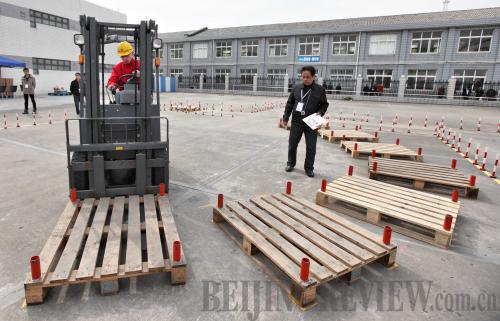|
 |
|
LOGISTICS COMPETITION: Contestants compete against each other on how to best operate a forklift at the 2013 Jiangsu modern logistics skill contest held on March 30 (XU PEIQIN) |
Detailed Curbs
A month of heated debate, guesswork and worrying has ultimately come to an end as cities across China confirmed details of property curbs created to tame an overheated market.
On March 30, Beijing, Shanghai and Chongqing, along with Hefei of Anhui Province and Xiamen of Fujian Province announced precisely how they will implement the Central Government's regulatory plan set earlier this month.
With no firm timeline set for the imposition of the measure, which is designed to cool the red-hot property sector, many are racing to sell.
South China's Guangdong Province was first to detail its implementation of the measures on March 26.
Beijing ruled that single adults with permanent local residence, and who have not made purchases in the city before, are allowed to buy only one apartment.
Shanghai said banks would be banned from giving loans to local residents who are buying a third apartment or more.
The two cities both vowed to strictly implement the 20-percent tax on capital gains from property sales.
Chongqing pledged that the growth rate for home prices would be lower than growth in per-capita income in order to make homes more affordable for purchase.
Upbeat Outlook
Despite moderation in the Chinese economy, U.S.-based companies remain upbeat on the near-term outlook of their businesses in the country.
Over three quarters of respondents indicated that they are optimistic about how their companies will perform over the next two years, according to the Business Climate Survey conducted by the American Chamber of Commerce in China.
U.S. companies turned out strong performances in China last year, as 71 percent of respondents said they posted sales growths in 2012 and 44 percent reported better operating margins in China than the global average, according to the annual survey conducted among 325 member companies of the chamber.
More U.S. businesses are oriented toward selling in the Chinese market, rather than seeing the country only as a processing and export hub. The percentage of respondents who said their goal this year is to sell directly to China reached a record high of 71 percent.
However, the percentage of respondents who plan to increase investment by 21-50 percent dropped from about 30-18 percent over the past four years.
The results reflect a slightly more conservative business outlook amid China's focus on promoting higher-quality economic expansion in an era of rebalancing, the chamber said.
| 